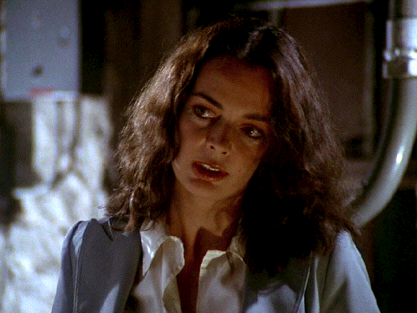Director: Joe Dante
Writers: John Sayles, Richard Robinson
Producer: Jon Davison
Cast: Bradford Dillman, Heather Menzies, Kevin McCarthy, Paul Bartel, Belinda Balaski, Melody Thomas Scott, Shannon Collins, Barbara Steele, Dick Miller, Keenan Wynn, Bruce Gordon, Barry Brown, Shawn Nelson, Richard Deacon, Janie Squire, Roger Richman, John Sayles (uncredited), Guich Koock, Bill Smillie, Eric Henshaw, Jack Pauleson, Virginia Dunnam, Diamond Farnsworth, Robyn Ray, Robert Vinson, Mike Sullivan, Bruce Paul Barbour, Jack Cardwell (Brandy the dog)
Skip tracer Maggie McKeown (Heather Menzies) is sent to Texas to find a young couple. Her search leads her to a remote area where she meets an unemployed, hard-drinking recluse named Paul Grogan (Bradford Dillman). She convinces him to be her guide and together they explore the nearby, seemingly abandoned US Army facility where a pool and lab were kept to use for bioweapon research. Finding some clothing and hiking gear that belonged to the missing couple, Maggie drains the pool to see if their bodies are at the bottom. Unfortunately, this has released a school of voracious mutant piranha into the local river that head downstream towards a summer camp and the newly opened Lost River water park.
The Flashback Fanatic movie review
John Sayles’ and Richard Robinson’s script goes a long way to distinguish this film from its Jaws inspiration. It has a lot of humor that never goes so far as to diminish the horror or our involvement in the situations and the main characters. The story raises concerns about the direction that military research can still go in peacetime. As one character states: There will always be wars. There also will always be cover-ups and greed that can jeopardize public safety.
After co-directing Hollywood Boulevard (1976), which included horror elements, Joe Dante’s first solo directed film Piranha established him as someone who knows how to deliver multi-faceted exploitation that should satisfy any fright flick fan. The film has nice images, suspenseful build-ups to the bloody climaxes, race-against-time pacing, and good performances from its simply drawn characters.
Heading up the cast are Heather Menzies and Bradford Dillman. As our skip tracer heroine Maggie McKeown, Menzies is the impulsive and confident counterpoint to Dillman’s surly recluse Paul Grogan. Dillman often played unlikable characters, so it is fun to see him here eventually shift into hero mode. They make an appealing pair of protagonists because they are not presented as infallible icons ready to kick ass and save the day. They have their faults and quirks that make them interesting and that’s why we are rooting for them. Their initial friction with each other and then their teamwork provides humor that enlivens their ongoing efforts to stop the piranha threat.
Kevin McCarthy, as the hermit scientist Dr. Robert Hoak, provides another hysterical warning about a sci-fi menace as he did back in Invasion of the Body Snatchers (1956). This time around, he is responsible for developing the menace that is unknowingly unleashed by our heroine Maggie McKeown. Hoak provides the necessary and interesting exposition about his research that helps to establish the film’s cynicism regarding government and the military.
That '60s Italian horror film icon Barbara Steele is a presence as unsettling as the piranha. Her character of government scientist Dr. Mengers had collaborated with Hoak on the development of the new piranha species. Unlike Hoak, she is not conflicted about the deadly consequences of the experiment getting out of control. Her assurances to the public are more about public relations than public safety.
Paul Bartel, as the priggish summer camp director Dumont, and Dick Miller, as Lost River Aquarena entrepreneur Buck Gardner, provide plenty of humor. They also contribute to the terror and tragedy as they refuse to believe the warnings of danger about the escaped piranha.
Two years before summer camps became the preferred stomping grounds for murdering maniacs, Piranha racks up a bloody body count that includes a lot of preteens among its victims. This lends an extra nasty edge to the flick that reminds us just how high the stakes are if this menace is not stopped.
Since the script, direction, and performances engage us in different ways with horror, humor, science fiction, and suspicion of authority, this movie has just enough complexity to make this escapist fun very satisfying. Piranha is a perennial summertime film favorite of mine, so in those lazy, hazy, crazy days of summer, I invite you to take a trip down Lost River. If you like blood with your bikinis, you can’t go wrong.





























